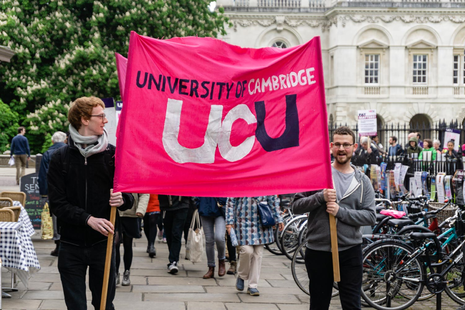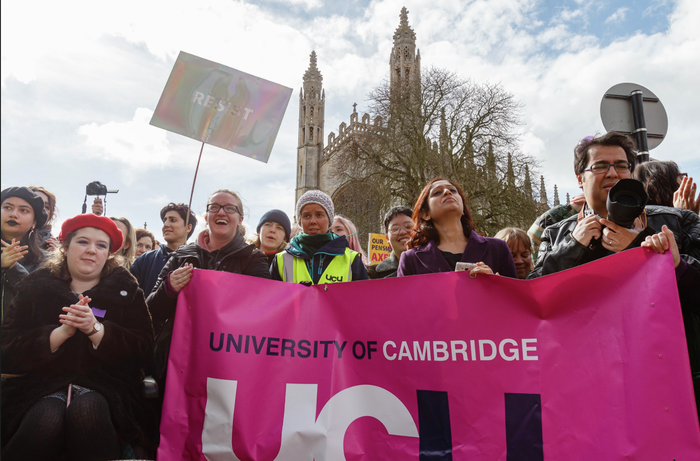UCU and SU launch ‘Justice4CollegeSupervisors’ campaign to improve supervisor working conditions
The campaign has issued several demands, including paid training, revision of pay rates, and employment contracts for casualised teachers

The Cambridge branch of the University and College Union (UCU) and Cambridge Students’ Union (SU) have launched a campaign calling for a “major overhaul” in the “terms and conditions” of hourly-paid college-employed undergraduate supervisors, the union announced on Thursday (15/04).
Backed by some university staff, as well as Cambridge MP Daniel Zeichner, the campaign has launched a petition addressed to senior tutors, making several demands regarding supervisors’ working conditions. These include paid training, amendments to the supervision pay rate to “reflect the full number of hours spent on class preparation”, and “employment contracts for casualised teachers who supervise undergraduates for colleges”.
The press release states: “Although Cambridge University prides itself on its college-based ‘supervision’ teaching system, the reality for those paid to teach undergraduate students for the Colleges is altogether different.
“Many of these hourly-paid teachers lack even a basic contract or a guarantee of the minimum wage.”
Jo Grady, the General Secretary of the national UCU union, has backed the campaign, describing supervisors’ current working conditions as a “moral stain”: “While Cambridge's managers and college masters enjoy big pay packets and perks, the supervisors who are the backbone of the university's undergraduate teaching system are being exploited with poverty pay.”
She added: “Casualised supervisors are sometimes on precarious contracts, but often are without any contract at all. Staff are fed up with being treated like this. Cambridge is one of the world's wealthiest universities. Its colleges have more than enough money to pay staff fairly.”
Cambridge MP Daniel Zeichner has also called for action, saying: “The system for paying supervisors needs to be overhauled. We all agree supervisors are doing a highly specialised job. Currently there isn't a forum to make sure all the parties involved get the certainty that they need: colleges, departments, supervisors and students.”
“We need better consultation with supervisors on pay rates, terms and conditions. Cambridge’s supervisions are what makes the University stand out, but everyone doing the job should be treated properly,” he continued.
The Cambridge SU Welfare and Community officer, Alice Gilderdale, who has been involved in discussing the demands with the Colleges, said: “We have made the case in writing to the colleges about how they can fix this system, both for the benefit of supervisors and for the students they teach.”
“Cambridge prides itself on its supervision system, but it is propped up by obscene inequality. We hope that our demands will be acted on in full this academic year but, if they are ignored, our campaign will continue rallying support from supervisors and students to end the injustice in Cambridge’s supervision system,” she added.
Lorena Gazzotti, Cambridge UCU branch secretary and campaign organiser, said: “Since 2018, Cambridge UCU has been talking to undergraduate supervisors across the collegiate university who are fed up with how they are being treated.”
She added: “The COVID-19 crisis has pushed many more to continue supervising so that they can pay their rent; without a fair rate of pay or a contract, they are at a huge personal and financial risk. The colleges must address the unfairness at the heart of the supervision system, by giving all supervisors a proper contract and fair payment. The exchanges we had with representatives from the Colleges so far have been underwhelming.
“This is not acceptable, especially for such wealthy institutions: we want the 31 Colleges to take this issue seriously and properly negotiate the working conditions of undergraduate supervisors with us. Workers are getting organised, and we are ready to campaign until our demands are met.”
According to a survey conducted by the University's UCU branch in 2018, 66.1% of supervisors polled said they conducted at least three hours preparation per hour of paid contact time, meaning that many of them are earning substantially below minimum wage. The survey also found that 45% of undergraduate supervision teaching was done by the university’s most casualised academic workers, including postgraduate students, freelancers and postdoctoral researchers.
Describing the study, the press release states: “This supervising load comes at a heavy cost for these staff: they experience significant and unpaid demands on time in the training, planning and preparation for supervisions, uncertainty arising from unpredictable hours, and meagre remuneration offered by the colleges.”
Varsity has contacted the University for comment.
 News / Colleges charge different rents for the same Castle Street accommodation2 March 2026
News / Colleges charge different rents for the same Castle Street accommodation2 March 2026 News / News in Brief: waterworks, wine woes, and workplace wins 1 March 2026
News / News in Brief: waterworks, wine woes, and workplace wins 1 March 2026 News / Climate activists protest for ‘ethical careers policy’1 March 2026
News / Climate activists protest for ‘ethical careers policy’1 March 2026 News / Angela Merkel among Cambridge honorary degree nominees27 February 2026
News / Angela Merkel among Cambridge honorary degree nominees27 February 2026 News / Private school teacher who lied about Cambridge degree barred from teaching27 February 2026
News / Private school teacher who lied about Cambridge degree barred from teaching27 February 2026










